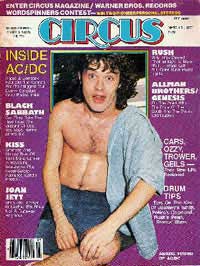Lifeson Arrives Stage Center With Rush
By John Swenson, Circus, March 31, 1982, transcribed by pwrwindows

Alex Lifeson, the lanky blond guitarist whose playing is the cornerstone of Rush's live sound, is relaxing in his midtown Manhattan hotel room after a spectacular two-hour performance at Madison Square Garden. He's dressed in the striking red suit that has given Rush an almost new wave look, and is wearing an airplane pin emblematic of his recent enthusiasm for flying his collection of motorized models. (Alex pilots the real thing whenever he gets a break in Rush's busy touring schedule, like the one he has this spring.)
Lifeson is soft-spoken and modest in interviews, but has matured into one of rock guitar's most full-throated voices in front of his fans. His playing is the featured element of Exit...Stage Left, the group's second PolyGram double-live LP, which documents the dynamic stage show that has propelled the band to glory. Drummer Neil Peart, bassist/keyboardist/vocalist Geddy Lee and Lifeson caught that interplay between themselves and audiences from Glasgow to Edmonton on Exit...Stage Left, performing such staples of their current sets as "The Spirit of Radio," "Closer to the Heart" and the European hit single, "'Tom Sawyer."
Lifeson grins as he points out the progress his band has made since releasing its first live LP five years ago. "All the World's a Stage is obsolete now," he insists. "I can't listen to it at all. And yet it was one of our most popular albums."
Lifeson can savor his success all the more because of the abuse he's taken over the years. It's been a long, uphill climb from the days in the late '60s when he and Geddy Lee worked in gas stations and as house painters around their native Toronto, then retreated into basement rehearsal rooms where they played long versions of Cream's "Spoonful" and Led Zeppelin tunes to nurture their dreams of stardom.
When critics blasted Rush for their stylistic similarity to Zeppelin on their early albums, Lifeson's guitar playing absorbed much of the blame. But Alex worked hard to perfect his playing, and now that he's become one of rock's premier axemen, he freely admits that the critics who insulted his playing were not entirely off the mark.
"I learned a lot from that first live album," he says. "Live albums are not as easy as you think. After we'd recorded all the material, we figured we'd go into the studio and mix it for two weeks, and it wouldn't be a big deal. We did one mix, but it sounded like a studio album. We did another mix and tried to capture the way it sounded out in the house, but it was too cluttered. Then we did a third mix, which was a combination of the two. It's really a difficult album to listen to. It sounds so primitive-to me, the guitar on that album doesn't have what I would call a good sound. It doesn't have anywhere near the depth or dynamics that it has now."
Lifeson thinks that the band's recent decision to update its staging for the first time since starting out improved the sound tremendously on the exhaustive tour that took Rush from Michigan to East Troy, Wisconsin in five whirlwind months. Judging from his brilliant, vertiginous solo, "La Villa Strangiato," in which he displays an awesome array of bleating, whooping, soaring and stinging guitar lines, it's easy to agree with him. Exit...Stage Left, which reached # 8 its second week on the charts, captures Lifeson so well you can easily close your eyes and imagine yourself in the front row.
Private Rush
Rush drummer Neil Peart says that even though he and the band don't have the commercial need to tour as much as they once did, it's still musically important. "Like anything else," he says, "if you stop doing it for a while you get complacent, and your abilities atrophy. So I think it's important to work a lot. Traveling is important too, in terms of new input and staying in touch."
Neil admits that the members of the band aren't public people, "so it's a constant battle trying to adjust to public life. None of us is the type to smile and say, 'Hey, you're beautiful,' and unfortunately, people expect an unreal facade. They expect you to play a role for them because it's their fantasy. You're their hero; therefore you should do what they want you to.
"If you try to walk away from it, you feel guilty because you're hurting people's feelings or destroying their illusions. On the other hand, if you play up to it, and put on the act and the song and dance, pretty soon you become just what they think you are."